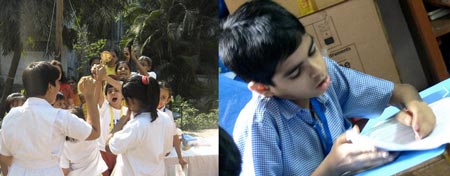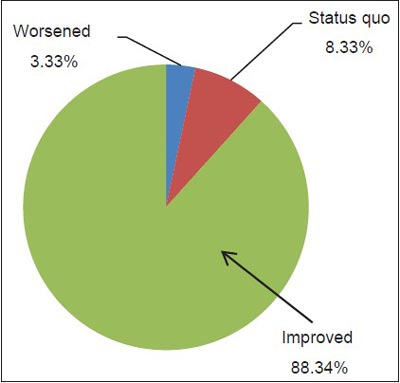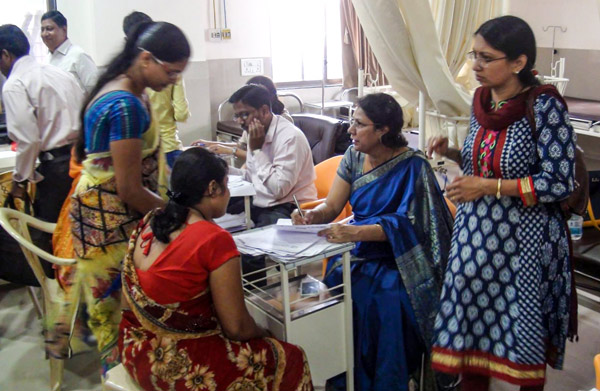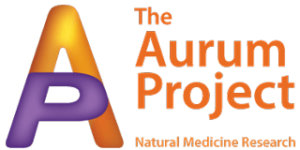In India, research about homeopathy for autism has shown that the therapeutic system of homeopathy may be effective in the management of autism spectrum disorder. Research has aimed to answer many questions including: What is the scope of homeopathy in the treatment of autism? In which symptoms can we more often expect to see improvement and under what circumstances? Then also, in which behaviours has it been found that we can not very often expect to find improvement?
How common is autism?
There are many different reports about the incidence of autism around the world. However there is no disagreement about the fact that the number of children diagnosed has risen in recent years:
America – In America, autism is reported to occur in all racial, ethnic, and socioeconomic groups. The incidence is 1 in 42 boys and 1 in 89 girls
India - The process of obtaining a diagnosis of autism in India is improving in the major cities. As more children are diagnosed and awareness of the disorder spreads, there will be a demand for services. ‘‘In India, children with autism are seen rather late and hence the diagnosis is not very difficult.’’ More than 10 million children in India are likely to have autism. Reportedly around 1 in 66 children between the ages 2 and 9 are affected in India.
Australia - According to the Australian Bureau of Statistic: In 2015, there were 164,000 Australians with autism, a 42.1% increase from the 115,400 with the condition in 2012.
Differently-abled Children are treated at the Spandan Clinic in India
The Spandan Clinic in Mumbai is at the forefront of conducting research using homeopathy for autism and is an example of excellence in homeopathy in India. The clinic is run by the M.B. Barvalia Foundation and their multidisciplinary team provides integrated care for Differently-Abled children. In the last three years, there have been 2,400 children with disability & mental health problems who received treatment.
The Spandan Clinic and Institute have been awarded Centre of Excellence status by the government Ministry of Ayush-Health.
Their team includes Homeopaths, Neurologists, Clinical Psychologists, Special Educators, Physiotherapists, Counselors, Pediatricians, Pediatric Orthopedic Surgeons, Psychiatrists Occupational Therapists, Speech Therapists, Social Workers and Yoga Therapists.
As a good example of the growth of homeopathy in India, the Spandan Clinic now includes:
- Clinical Center for Children with Disability
- Special School for slow learners, and special programmes for children with Mental Retardation
- A Comprehensive Neuro-Muscular Rehabilitation Unit for children
- Remedial Therapy Center for children with Learning Disabilities
- Holistic Intervention for Adolescents
- Spandan Holistic Mother and Child Care Hospital
- Operation theater, comprehensive diagnostic services
- Outreach Projects: In slum areas Free Screening Camps organized to allow an early diagnosis and intervention
- The Holistic Institute of Applied Homeopathy which provides advanced Homeopathic education to Interns, Homeopathic Graduates and Post Graduates. Experienced homeopathic practitioners as well as allied professionals attend this course.
What does Spandan mean?
In Sanskrit, the word Spandan means vibration. So the name Spandan was chosen because of the strong emphasis the clinic and institute has on providing vibrant and holistic homeopathy in its clinical services.
Dr Barvalia says "Our institute skillfully utilizes Homeopathy, Yoga and Sensory Integrative Therapy to help the integration of sensory processes which is crucial right from infancy. Faulty integration contributes to the development of various learning as well as developmental and behavioral disorders. Thus, it is essential to restore the sensory processes first, to deal with these disorders." The word Spandan symbolizes this entire process. One of the reasons for starting the clinic was when "I realized there was a strong correlation, an interface, between the sensory integration developed by occupational therapy, and homeopathic treatment. Both these therapies, worked at some level of the child’s disturbed energy pattern, and seemed to set things on the right course."
Prof. Dr. Praful Barvalia has presented the work of the Spandan Clinic at many conferences and he was a Keynote Speaker at the Malaysian International Integrative Health Care Conference 2017.
Research about homeopathy for autism
From 1998 to 2003 the Spandan Clinic conducted a case series study of 54 autistic children. In this study, 72% of cases who continued homeopathy for autism for more than six months showed significant improvement in the following order:
- Hyperactive behavior like restlessness and tantrums
- Impaired sensory defenses
- Eye contact
- Speech.
60% of cases with mild autism regained speech.
50% of cases (without significant retardation), who continued for more than two years were rehabilitated in mainstream school or slow learners class while others were enrolled in Special School.
Obsessive acts and self-stimulation showed insignificant change in first six months and took longer to respond.
This study demonstrated modifications in the behavior of autistic children as well as improvement in sensory impairment thus reducing autistic features.
The second of two autism research studies was conducted from 2006 to 2009
The second study included 60 children. The cases were enrolled from the Spandan Holistic Institute of Applied Homoeopathy and from the institute's mobile clinic. A series of workshops for parents and teachers were held about the role of homeopathy for autism. Similar seminars were held in the urban slum areas of the Greater Mumbai Municipal Corporation.
Certain children were excluded from the trial due to the following reasons:
- Chronic infections like HIV or tuberculosis
- Very severe autism with a history of violent exacerbations or having pharmacological treatment.
This study was a non-randomized, self-controlled, pre and post-intervention study with six months as a self-control period. The diagnosis of autism was made by a team consisting of: homeopathic physician, psychologist, neurologist and psychiatrist. One year was the treatment period.
All patients received carefully chosen homeopathics in which Stramonium, Tarentula hispanica, Calcarea carbonica, Natrum muriaticum and Carcinosinum were the most commonly prescribed. Centesimal scale potencies were used commencing with 200C potency. When there was no further improvement, the potency was raised to 1M and later 10M.
A total of 23 cases demanded infrequent doses (where the remedy is repeated eg: every two weeks), while 28 cases demanded moderately frequent repetition (where the remedy is repeated eg: once a week), while nine cases required very frequent repetition (where the remedy is repeated once, twice or three times every day).

Children at the Spandan Clinic and Special School
What was the response to treatment?
The Autism Treatment Evaluation Checklist (ATEC) measures communication skills, socialization, cognitive and sensory awareness and general behavior. Many parents, teachers and researchers use the ATEC to monitor how well a child is doing over time.
The ATEC scores during the six months prior to homeopathic treatment (control period) indicated worsening of autism behaviours and after homeopathy was introduced the ATEC scores indicated improvement. The ATEC score was evaluated every three months during the entire period of the study. ATEC was one of several rating scales and tests used to measure improvement.

At one year post-treatment, 88.34% of children were improved, 3.33% worsened and 8.33% stayed in status quo
The study demonstrated a statistically significant reduction in autistic features. Homeopathy brought about improvement in behavior followed by significant changes in other aspects eg, sensory impairment, socialization and communication.
The pace of improvement after homeopathic intervention is worth studying. There was marked improvemnt in the ATEC score within the first quarter of the year after intervention. This implies the positive role of intervention. This is consistent with what Dr Rimland has written about ATEC. If improvement occurs due to the child just growing up, then gradual improvement is seen over a period of time. However, if there is a perceivable improvement after the intervention is started then treatment is helping.
Homeopathic treatment had a statistically significant impact on the cognitive ability of all autistic children. Importantly (because it is not what you would expect) children with dull normal intelligence showed the highest improvement followed by children with mild retardation.
88.34% of children improved with the response being: mild (16 children), moderate (21 children), or marked (16 children) improvement.
By effectively reducing core autistic features consistently over a one-year period, this autism research demonstrated a good improvement in the children's ability to get on with life, their activities of daily living improved and even scholastic performance.
Autism research has demonstrated the usefulness of homeopathy for autism
This Indian autism research has demonstrated the usefulness of homeopathy for autism, which is reflected in the significant reduction of hyperactivity, behavioral dysfunction, sensory impairment as well as communication difficulty.
Around the world there are many homeopathy autism recovery stories and there is a cry from parents for natural autism treatment. So, a more extensive multicenter double-blind study with a diverse population is called for. Around the world researchers, parents and practitioners are calling for more autism research. Parents want to have an answer to the question "Is autism curable with homeopathy?" Practitioners want to document the good results they see knowing that progress will be slow but steady for most children. To read more research in autism spectrum disorders and case series click here.
Impressive growth of Homeopathy in India
To explain the status of homeopathy in India and the impressive development of homeopathy in India , Shri Shripad Yesso Naik (AYUSH minister) has said that the government of India is doing everything possible to promote homeopathy research and wants to encourage new researchers to help make India the leader in the arena of Homeopathy.
Shri Shripad Yesso Naik is the Government Minister for the government Department of Ayurveda, Yoga, Unani, Siddha and Homeopathy (AYUSH).
“My Ministry lays the highest importance to homeopathy research. We have established the Central Council for Research in Homeopathy, a pioneer research organization for carrying out high quality research in all aspects of Homeopathy. This includes clinical research, drug standardization and basic research. I am happy to share that this Council is also spreading its wings to collaborate with reputed international and national institutes for undertaking valuable research in homeopathy such as exploration of homeopathy as a Nano-medicine. We are inculcating research aptitude in students through specially designed schemes of scholarship in addition to capacity building of homeopathic colleges”, said Shri Shripad Naik.
Since you're here...
…. We have a small favour to ask you. More people than ever before are reading the Aurum Project blog. There is a surge of interest in natural therapies research. But grants or support from funding bodies is hard to come by. So you can see why we would like to ask for your help. The Aurum Project is an Australian independent research group with charity status. Our research takes a lot of time, money and hard work to keep pushing forward. But we love it because we believe our work is important and we’ve been told by parents over and over again that they believe what we do is important too. For as little as $5 per month you can help support our work. All donations are tax deductible. It will only take a minute. Thank you. Click here to donate today.

Autism research using homeopathy in India at Spandan Clinic
